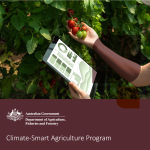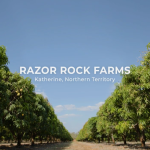Advancing Sustainable Farming: The Story of Carbeen Park
In the heart of the Northern Territory, just west of Katherine, Carbeen Park is setting a new standard for sustainable agriculture. Spearheaded by Munro Hardy, a seasoned professional in the cattle industry with a growing passion for farming, the park is a testament to how traditional farming practices can be enhanced through modern technology. This transformative journey at Carbeen Park has been made possible through the support of the Future Drought Fund and in collaboration with NT Farmers. By integrating soil moisture probes and weather stations into their farming operations, the initiative is not only about advancing agricultural practices but also about nurturing a more sustainable relationship with the environment.
The Role of Technology in Water Management
Water is the lifeblood of agriculture, yet its scarcity in drought-prone regions like the Northern Territory presents significant challenges. Recognising this, Munro Hardy and his team have turned to technology for solutions. Soil moisture probes, in particular, have become invaluable tools at Carbeen Park. These devices provide real-time data on soil moisture levels, enabling informed decisions on when and how much to irrigate crops, thus ensuring water is used as efficiently as possible. The benefits of using such technology extend beyond water conservation. By optimising irrigation, Carbeen Park is able to support the health and yield of their crops, from sorghum to legumes like cavalcade and cowpea. This not only boosts productivity but also contributes to the overall sustainability of the farming operations.
Environmental Advantages and Sustainable Practices
The adoption of soil moisture probes and weather stations at Carbeen Park also brings broader environmental benefits. Efficient water use helps minimise runoff and the potential for soil erosion, safeguarding local waterways and ecosystems. Moreover, maintaining optimal soil moisture levels improves soil health, which can enhance its ability to sequester carbon and support biodiversity. This approach to farming aligns with the principles of climate-smart agriculture, which seeks to address the challenges of climate change while ensuring food security. By building soil organic matter and improving soil health, Carbeen Park is not only mitigating the impacts of climate variability but also laying the groundwork for a more resilient agricultural sector.
Collaboration and Future Prospects
The success story of Carbeen Park is a shining example of what can be achieved when farmers, technology, and supportive partnerships come together. The collaboration with NT Farmers, underpinned by funding from the Future Drought Fund, underscores the potential for technology to revolutionise agriculture in the face of changing climatic conditions. As Carbeen Park continues to embrace and refine these technological interventions, the future looks promising. The data gathered from the soil moisture probes and weather stations will not only inform immediate farming decisions but also contribute to a growing pool of knowledge that can benefit the wider agricultural community. Carbeen Park’s journey is a beacon for sustainable farming practices in the Northern Territory and beyond. By harnessing the power of technology and fostering collaborative partnerships, the Carbeen Park is navigating the challenges of modern agriculture with resilience and innovation.
This story serves as an inspiration for other farmers and stakeholders in the agricultural sector to explore the potential of technology in achieving a sustainable and prosperous farming future.


